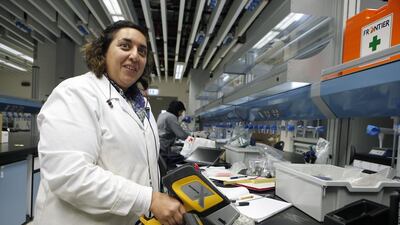ABU DHABI // Engaging Emirati students in scientific research is crucial for the developing economy, academics say.
Dr Aisha Al Suwaidi, an Emirati academic at the Petroleum Institute, said there was a growing demand among Emiratis for research facilities.
“We grew up in the generation of the 1980s where there wasn’t anything here other than UAE University, so our only option was to go abroad to study,” Dr Al Suwaidi said.
“There wasn’t anything that wasn’t business or humanities, so people in the sciences had to travel to countries with a research culture. When we were abroad we were exposed to that and from age 18 were very involved in research.
“In the early days of PI, research was still an alien culture for our students but in the past five years, you can really see that evolving. People actually come here and ask us what research projects we have going on.”
The institute’s annual research competition, where some students have gained patents for projects, has inspired those undergraduates to take their science careers further.
“For some of them, the lightbulb goes on and they want to stay in academia,” said Dr Al Suwaidi. “It’s an opportunity to engage the students in research that wasn’t previously available.”
It is estimated that fewer than 10 per cent of academics in the UAE are Emirati.
Dr Saeed Al Hassan, another Emirati faculty member at the Petroleum Institute, said he hoped to inspire others to follow in their footsteps.
“A lot of undergraduates are not exposed to research, which is the key to get them excited about academic research,” Dr Al Hassan said. “Before they decide to get on to a master’s or PhD, they should at least taste it.”
Dr Al Suwaidi said engagement should start before students arrived at university.
“Research should start earlier. Even in high school I did a research project in my international baccalaureate school.
“From 16 years old I’ve been passionate about research. A lot of people I know who had the same experience in IB went on to do PhDs so it’s really important to have this engagement early.
“It has to start before the undergraduate years. Many students don’t get that research exposure until the second year of their degrees or later.”
She said all universities faced these challenges. “If things don’t change, fewer and fewer people will come to academia.”
The UN says about 0.7 per cent of the UAE’s GDP is spent on research, mostly by businesses, which spend more than Dh11.4 million a year compared with universities, which spend Dh2.6m.
Austria, which has a lower population than the UAE, last year spent 3 per cent of its GDP on research – a total of US$10.9 billion, or Dh40bn – the Organisation of Economic Cooperation and Development says.
Research is a vital means of attracting new scientists, said Dr Thomas Hochstettler, president of the Petroleum Institute, which is soon to be merged with Khalifa University and the Masdar Institute.
“The new PI research centre provides a concentration of human and experimental resources that allows students to engage at a very early stage in their educational careers in actual, real-time experiments that, at least for a good number of them, capture their imaginations and lead them into research as a lifetime goal,” Dr Hochstettler said.
He said schools were helping the process of cultivating an interest in science.
“Schools in the UAE are doing an amazing job of preparing students for study in the sciences at university level,” Dr Hochstettler said.
“Our students arrive prepared to learn, well equipped with the basic mathematical, communications and scientific backgrounds to be able to learn at a very high level at a very early point in their university career.”
Dr Al Suwaidi said that Emiratis had to be more engaged in the scientific environment, not just through their studies, and included those working in laboratory support.
“If we don’t change this, it means we don’t have a young generation of Emiratis qualified to run our labs,” she said.
“There has to be investment in research to support technical training of lab staff.
“These roles are equally important as ours because we can’t do our jobs without that support.”
mswan@thenational.ae

